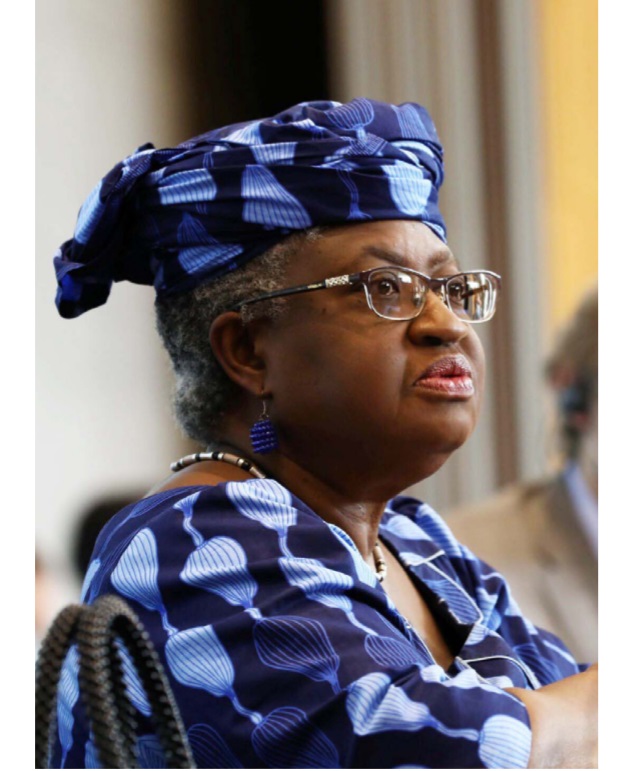
Unclear if move is attempt to sabotage trade body much criticised by Trump
| THE INDEPENDENT | The U.S. is blocking the appointment of Ngozi Okonjo-Iweala as the next head of the World Trade Organization despite the former finance minister of Nigeria winning the overwhelming backing of the WTO’s 164 members, it has emerged.
Dr Okonjo-Iweala had moved a step closer to becoming the first woman and the first African to be director of the global trade watchdog after securing the support of a key group of trade ambassadors in Geneva. Soundings taken by a selection panel of three WTO trade ministers found she had far more support than her South Korean rival, Yoo Myung-hee.
Okonjo-Iweala, a former Finance minister of Nigeria and an American citizen, in 2016 delivered the keynote speech at the 24th Annual Joseph Mubiru Memorial Lecture to mark the Golden Jubilee of the Uganda central bank.
Sources said she was backed for the WTO top job by countries in the Caribbean, Africa, the European Union, China, Japan and Australia.
However, her candidacy failed to win the support of Washington, which raised last-minute objections to the process by which the new director general was being picked. An original list of eight candidates, which included the former British international trade secretary Liam Fox, has been whittled down to a final two in early October.
By tradition, the WTO chooses its director general by consensus, with all 164 members having to approve a candidate. The US has been unhappy with the way the WTO has operated for some time, objecting to China’s designation as a developing country and blocking the appointment of new judges to the organisation’s appeals body.
According to a report in the Guardian newspaper of the UK, sources said it was unclear whether Washington’s opposition to Okonjo-Iweala was a deliberate attempt to sabotage an organisation much criticised by Donald Trump.
A WTO spokesman reportedly said her candidacy would be put to a meeting of the body’s governing general council on 9 November, adding that there was likely to be “frenzied activity” in the meantime to secure consensus.
In the event that Washington maintains it will not support Okonjo-Iweala, the WTO’s constitution does eventually provide for a vote, although every previous director general in the organisation’s 25-year history has been appointed by consensus, and trade experts said life would be difficult if an appointment was made against the wishes of the U.S.
ources in Geneva said it was possible the U.S. position may be affected by the result of next week’s presidential election, which Joe Biden is currently expected to win.
A spokesperson for Okonjo-Iweala said on Oct.28: “Dr Ngozi is immensely humbled to receive the backing of the WTO’s selection committee today.
“Dr Ngozi looks forward to the general council on 9 November when the committee will recommend her appointment as director-general. A swift conclusion to the process will allow members to begin work together, on the urgent challenges and priorities.”
In a September interview with the Guardian, Okonjo-Iweala said poorer nations had lost faith with the WTO owing to its failure to deliver on the promise of trade liberalisation focused on development.
Okonjo-Iweala said her lack of hands-on experience as a trade minister or negotiator did not mean she lacked the qualifications to be the next head of the WTO and said the real issue was a fundamental breakdown in trust among the organisation’s 164 members.
“I have a very strong trade background. Trade is not a siloed discipline. Trade is part of development, something I have been working at my whole life.
“It’s true I am not a WTO insider but that’s a good thing. We need someone who knows trade but brings a fresh pair of eyes.
“There are a lot of people with technical skills at the WTO. There is no shortage of trade skills but the problems are there and they are getting worse. Something else is needed, strong political skills, someone able to engage leaders in a substantive way.”
Okonjo-Iweala said she had a track record of tackling difficult issues, having been responsible as Nigeria’s finance minister, for negotiating a debt reduction deal, and for securing more money for grants and soft loans to poor countries while No 2 at the World Bank.
“It can’t be business as usual,” she said. “It can’t be more of the same. It can’t be someone who just knows the issues and how the place works. We have tried that. Of all the challengers for the job I have the right combination of skills.”
Okonjo-Iweala said it was “absolutely essential” to have the U.S. engaged with the WTO, after a period in which Washington has been unhappy about trade rules that treat China as a developing country and the ability of appeal judges to make – rather than simply interpret – trade laws.
“The U.S. has a real frustration that its issues are not being taken onboard. I think it has a point. We need to get the Americans to stay in and work with them,” she said.
Since it was created in the mid-1990s the WTO has never had an African or a woman as its director general.
“Women have the qualifications and the experience but remain a sparse species in leadership circles,” Okonjo-Iweala said. “Look at heads of state: how many of them are women, just a handful? How many women are chief executives? A handful.”
As the co-author of a book with the former Australian prime minister Julia Gillard on women and leadership, Okonjo-Iweala said it was time to start redressing the gender imbalance in politics and business.
“Women face a glass cliff: they are given leadership roles only when things are going really badly.”
****
 The Independent Uganda: You get the Truth we Pay the Price
The Independent Uganda: You get the Truth we Pay the Price



